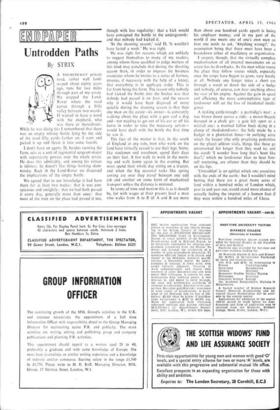alrAPD
Untrodden Paths
By STRIX
1 don't have an agent; D, besides running the farm, acts as a sort of regimental sergeant-major With supervisory powers over the whole estate. He does this admirably, and among his virtues is tidiness; he doesn't like things looking slum- mocky. Back in the Land-Rover we discussed the implications of the empty bottle.
We agreed that to our knowledge it had been there for at least two weeks: that it was con- spicuous and unsightly: that we had both passed it every day, generally more than once: that most of the men on the place had passed it too,
though with less regularity: that a kick would have consigned the bottle to the undergrowth: and that nobody had kicked it.
'In the shooting season,' said D, 'it wouldn't have lasted a week.' He was right.
He was right for reasons which are unlikely to suggest themselves to many of my readers, among whom those qualified to judge matters of this kind may conclude that during the shooting season Strix, in order to impress the business associates whom he invites to a series of bait ices, ensures, if necessary with the help of a knout, that everything is in apple-pie order. This is far from being the form. The reason why nobody had kicked the bottle into the bushes was that nobody had passed it on foot; and the reason why it would have been disposed of more quickly during the shooting season is that then one man on the estate—its owner—is constantly walking about the place with a gun and a dog and—not needing to get out of his car or off his horse in order to take the necessary action— would have dealt with the bottle the first time he saw it.
The fact of the matter is that, in the south of England at any rate, men who work on the land have virtually ceased to use their legs. Some, like stockmen and woodmen, spend their days on their feet. A few walk to work in the morn- ing and walk home again in the evening. But most spend their whole day sitting on a tractor, and when the big seasonal tasks like spring sowing are over they travel between one odd job and another on some form of mechanised transport unless the distance is minimal.
In terms of time and motion this is as it should be, for with wages at their present level a man who walks from A to B (if A and B are more
than about one hundred yards apart) is losing his employer money; and in my part of the world if one meets one of one's own men on foot one tends to ask, 'Anything wrong?,' the assumption being that there must have been a breakdown either of machinery or organisation.
I suspect, though, that the virtually complete mechanisation of all internal movements on an estate has its drawbacks. As the men whizz round the place they follow' routes which, especially once the crops have begun to grow, vary hardly at all. Nobody any longer takes a short cut through a wood or down the side of a hedge and nobody, of course, can hear anything above the roar of his engine. Against the gain in speed and efficiency the more contemplative type of landowner will set the loss of incidental intelli- gence.
A leaking cattle-trough: a partridge's nest: a tree blown down across a ride: a motor-bicycle dumped in a chalk pit: a gate left open or a mislaid axe: a maimed fallow buck dying in a clump of rhododendrons: the hole made by a badger in a plantation fence—in outlying acres which the keeper (the only practising pedestrian on the place) seldom visits, things like these go unremarked for longer than they used to; and the words 'I wonder how long that's been like that?,' which no landowner likes to hear -him- self muttering, are oftener than they should be on his lips.
`Untrodden' is an epithet which one associates with the ends of the earth: but I wouldn't mind betting that there are a great many acres of land within a hundred miles of London which, year in and year out, would stand more chance of actually feeling the imprint of a human foot if they were within a hundred miles of Lhasa.


































 Previous page
Previous page